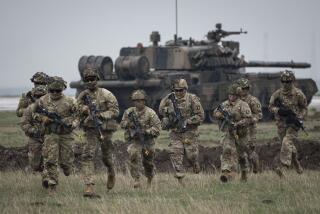Control of Bosnia Arms to Be Total, Official Says : Balkans: NATO commander declares deadline for withdrawal of weapons from Sarajevo is unambiguous.
- Share via
NAPLES, Italy — The Monday deadline for the withdrawal of heavy weapons from around Sarajevo is unambiguous, and U.N. troops will exercise total control of weaponry turned in by Bosnian Serb and Muslim-led government forces, the NATO commander who would order any air strikes said Wednesday.
“Control of weapons means that they are regrouped and collected and under U.N. control. If a warring faction wants to use those weapons, it would have to fight to get them,” Adm. Jeremy Boorda told reporters here, gainsaying speculation from Washington that the United Nations might settle for less than absolute authority over weapons remaining in the area after the deadline.
U.N. commanders in Bosnia-Herzegovina have exactly the same understanding of what control means, the American four-star admiral said.
“Our mandate hasn’t shifted. Our rules haven’t shifted,” said Boorda, who heads the North Atlantic Treaty Organization’s Southern Command here along with the bristling armada of NATO warplanes poised at Italian air bases and on carriers in the Adriatic.
Neither will the deadline shift, Boorda said. “It’s the U.N.’s deadline, and it’s the NATO deadline. There’s no ambiguity about that.”
A NATO ultimatum issued last week and aimed principally at the Serbs gives both sides in the struggle over Sarajevo until an hour after midnight Sunday to withdraw artillery, mortars and other heavy weapons from within a 12-mile radius of the Bosnian capital or turn them over to U.N. peacekeepers. Failing that, NATO warplanes--American, British, French and Dutch--could strike at the United Nations’ behest anytime thereafter.
NATO jets flew routine missions over Bosnia on Wednesday as training for possible attacks and to enforce a U.N. “no-fly” zone over the former Yugoslav republic.
One of the patrolling jets, an American F-16 fighter-bomber, crashed Wednesday morning after malfunctioning over Slovenia near that former Yugoslav republic’s border with northeastern Italy. The pilot ejected safely.
Boorda, who is favored to become the next U.S. chief of naval operations, according to reports from Washington on Tuesday, said he is in constant touch with the U.N. commander in Sarajevo, British Lt. Gen. Michael Rose.
Rose could ask for air strikes before Monday if there is new shelling of Sarajevo, which has lived under fire for 22 months. A weeklong truce there appears to be holding, however, despite minor violations that on Wednesday included the killing of a 56-year-old worker by a sniper.
Some analysts believe that the Bosnian Serbs have as many as 500 field pieces and mortars positioned around a city where 10,000 people have died since minority Serbs rebelled in 1992 to protest a Muslim-led secession from the disintegrating Yugoslav federation.
The Bosnian Muslim armory is relatively modest, U.N. officers say.
Boorda’s view of how well the ultimatum is respected will be easily measured. “I will be satisfied at midnight Sunday if the weapons are under control or out of the area. Nothing else is going to satisfy me,” the admiral said.
In a closed-door session at the United Nations on Tuesday, Kofi Annan, the U.N. undersecretary general for peacekeeping, laid a request for more troops and specialized equipment before ambassadors from the United States, Canada, Britain, France, Spain and the Netherlands, diplomatic sources said.
The menu had been prepared by Rose, who needs soldiers and radar equipment to help monitor Bosnian Serb weaponry in the hills around Sarajevo.
American sources also said Annan told the ambassadors that Rose had requested 2,000 to 3,000 troops and artillery-locating radar.
An American official present at the session said that “nobody volunteered a lot of troops.” And he emphasized that the United States did not volunteer any. “The United States does not supply ground troops” to the U.N. Protection Force, the official said.
In Washington, State Department spokeswoman Christine Shelly said the Clinton Administration’s policy precludes the dispatch of U.S. ground troops unless the warring factions agree to a negotiated peace settlement.
Diplomatic sources said that governments could send more troops to Sarajevo without convening the Security Council to pass a new resolution authorizing them. But Secretary General Boutros Boutros-Ghali has had a difficult time persuading governments to send more troops.
However, military analysts said France has agreed to send sophisticated counter-battery radar to U.N. forces in Sarajevo to help pinpoint Bosnian Serb artillery in the event of a NATO air strike.
Times staff writers Stanley Meisler, Norman Kempster and Art Pine in Washington contributed to this report.
More to Read
Sign up for Essential California
The most important California stories and recommendations in your inbox every morning.
You may occasionally receive promotional content from the Los Angeles Times.













